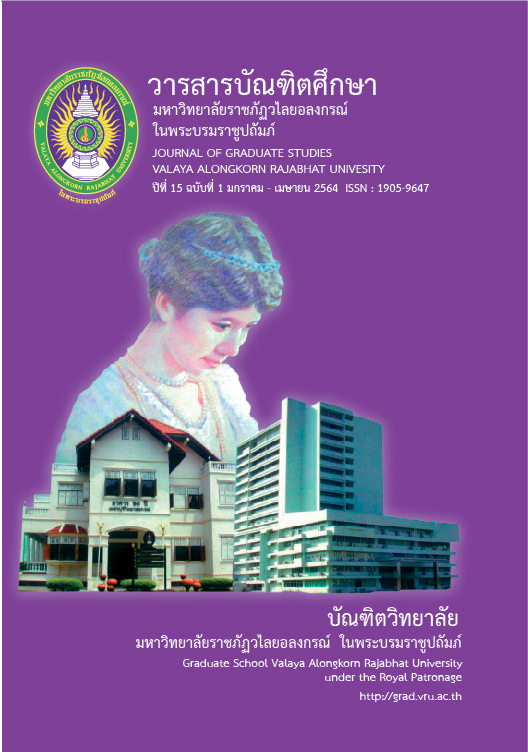THE EFFECTS OF PROBLEM-BASED LEARNING FOR DEVELOPING MATHEMATICAL THINKING ON STATISTICS TOPIC OF NINTH GRADE STUDENTS
Main Article Content
Abstract
The purpose of this research was to develop mathematical thinking in statistics topic for ninth grade students through problem–based learning. The participants consisted of 21 ninth grade students who studied in the second semester of the 2019 academic year. The research instruments were lesson plans, worksheets, a mathematical thinking test, and an interview. The data were analyzed using content analysis.
The results revealed that: before students studied with problem-based learning, they solved problems by copying the content from the problem and identify the wrong methods. They also used their personal thoughts and false representations during solving problems. During studying with problem-based learning, students solved problem by separating content in the problem into small parts and they could choose the appropriate problem solving method. They could explain the reason for not choosing the other methods and they had better mathematical thinking on representation. At the end of the study, students had better mathematical thinking on problem solving. They could identify the problem correctly and chose proper problem solving method. They had good mathematical thinking on reasoning competence and mathematical thinking on representation. Students could represent their thinking through words, graph, and mathematical symbols.
Article Details

This work is licensed under a Creative Commons Attribution-NonCommercial-NoDerivatives 4.0 International License.
บทความทุกเรื่องได้รับการตรวจความถูกต้องทางวิชาการโดยผู้ทรงคุณวุฒิ ทรรศนะและข้อคิดเห็นในบทความ Journal of Global of Perspectives in Humanities and Social Sciences (J-GPHSS) มิใช่เป็นทรรศนะและความคิดของผู้จัดทำจึงมิใช่ความรับผิดชอบของบัณฑิตวิทยาลัย มหาวิทยาลัยราชภัฏวไลยอลงกรณ์ ในพระบรมราชูปถัมภ์ กองบรรณาธิการไม่สงวนสิทธิ์การคัดลอก แต่ให้อ้างอิงแหล่งที่มา
References
Anonymous. (2018). khanǣn chalīa kǣt - phǣtō̜ thuk wichā mai thưng khrưng [Gat-Pat average score for all subjects is less than half]. Retrieved from https://www.dailynews.co.th/education/635892.
Barrows, H. S. and Tamblyn, R. M. (1980). Problem-based learning: an approach to medical education. New York: Springer Publishing.
Elshafei, D. L. (1998). A Comparison of Problem-Based and Traditional learning in Algebra ll. Retrieved from http://www.thailis.uni.net.th/dao/detail.nsp.
Illinois Mathematics and Science Academy. (2006). Introduction to PBL. Retrieved from http://www.imsa.edu/team/cpbl/whatis/whatis/slide3.html
Mudrikah, A. (2016). Problem-Based Learning Associated by Action-Process-Object-Schema (APOS) Theory to Enhance Students’ High Order Mathematical Thinking Ability. International Journal of Research in Education and Science. 2(1), 125-135.
Mustafa, S., Sari, V. & Baharullah. (2018). The Implementation of Mathematical Problem-Based Learning Model as an Effort to Understand the High School Students’ Mathematical Thinking Ability. International Education Studies. 12(2), 117-123.
O'Daffer, Ph. G., & Thornquist, Br. A. (1993). Critical Thinking, Mathematical Reasoning, and Proof. In Research Ideas for the Classroom High School Mathematics (pp. 39-56). New York: Macmillan.
Samart, P. (2012). kānphatthanā kān khit chœ̄ng khanittasāt khō̜ng nakrīan matthayommasưksā pī thī sō̜ng dōi chai krabūankān khit hai pen khanittasāt [Development of mathematical thinking of eighth grade students by using mathematizing process]. Retrieved from http://cuir.car.chula.ac.th/bitstream/123456789/45075/1/praemai_sa.pdf.
The Institute for the Promotion of Teaching Science and Technology (IPST). (2018). sarup phonkān pramœ̄n PISA sō̜ngphansiphā witthayāsāt kān ʻān læ khanittasāt [PISA 2015 Assessment Reading Science and Mathematics Excellence and equality in education]. Retrieved from https://pisathailand.ipst.ac.th/pisa2015summaryreport/.
The Institute for the Promotion of Teaching Science and Technology (IPST). (2019). phonkān pramœ̄n PISA sō̜ngphansippǣt [PISA 2018 Assessment]. Retrieved from https://pisathailand.ipst.ac.th/news-12/.
Wonglekha, F. (2010). kān rīan khanittasāt : khwām čhampen thī mai khūan mō̜ng khām [Learning mathematics : A necessity that should not be overlooked]. Retrieved from http://social.obec.go.th/node/83.


